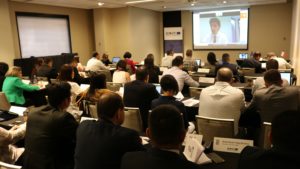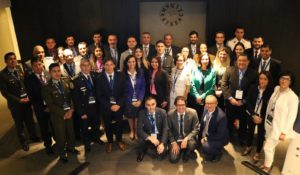The regional workshop was organised by EL PAcCTO in Santiago de Chile to design organisational models and procedures for police units and public prosecutors specialising in the fight against cybercrime, and to define effective international cooperation systems for Latin America and the European Union
Representatives and experts from 16 Latin American and European countries met with Ameripol, Ciber Red, Ibero-American Judicial Summit, Glacy, + Europol and Interpol for a workshop opened by Antonio Segovia, director of the International Cooperation Unit of the Office of the Prosecutor of Chile, Juan Gama, director of EL PAcCTO and Pascal Benitez, coordinator of the police cooperation component of EL PAcCTO.
The participants agreed upon the importance of transnational police cooperation and national coordination between agencies and departments, underlining that techniques must be modernised and there must be a constant point of contact between networks that fight cybercrime, if relations and/or cooperation between police units is to be effective.
“The cross-cutting nature of cybercrime requires coordination and cooperation between different agents who are assigned different responsibilities and capacities to protect cyberspace,” said the head of the telematic crime department of the Central Operational Unit of the Spanish Civil Guard, Lieutenant Colonel Juan de Sotomayor. “In this context, coordination and cooperation are essential at operational and strategic, local, regional and central levels”, added Sotomayor.
Discussions during the workshop also revealed that European research techniques, such as on-line content monitoring, cyber patrol activities, electronic evidence gathering and the requirement for judicial supervision to access electronic evidence are difficult issues to incorporate into the Latin American procedural framework, due to a lack of institutional coordination among peers.


The process of specialisation in cybercrime is aimed at specific, reinforced training in the investigation and prosecution of highly serious and complex criminal phenomena. According to the Prosecutor attached to the Central Unit against Computer Crime of the Attorney General’s Office of Spain, Patricia Rodriguez, “new investigative techniques such as undercover agents, searches of computer systems and mass storage devices and remote computers and computer system searches are exceptional techniques for serious crimes which must be implemented when an immediate and forceful response is required by state institutions.”
Manuel de Almeida Pereira, representative of GLACY +, participated by means of a video link from Romania and presented the legislation and general principles of the Budapest Convention. The information he presented clarified some countries’ perspectives on issues such as data conservation and protection, effective classification and time limits.
The fight against cybercrime encompasses a broader threat: the general fight against the technological capabilities of organised crime. Shortfalls in the approach to cybercrime mean that the same applies in the fight against large-scale trafficking and transnational organisations.
EL PAcCTO is continuing to fight cybercrime through regional and multi-country activities, the result of which was the ELIPSIA Network of police specialised in the fight against on-line child pornography between Latin America and the EU, integrating EMPACT and Europol in the same network.
